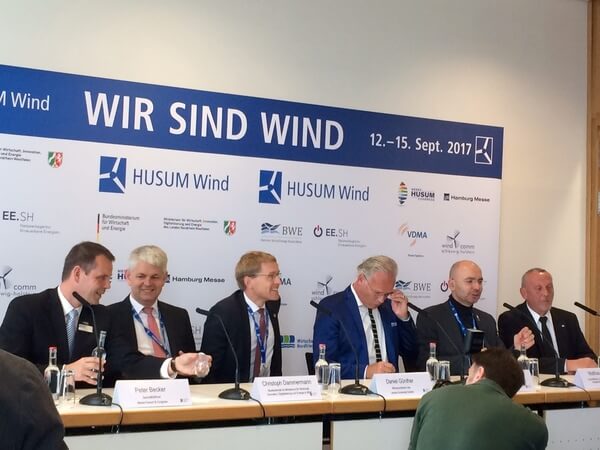News Release from windfair.net
Wind Industry Profile of
A storm is brewing for the wind industry
It was a striking difference how the two partner federal states handled the importance of the trade fair and thus the wind power industry in general. Freshly elected Prime Minister Daniel Günther (CDU) of host state Schleswig-Holstein in the north of Germany personally attended the opening ceremony of the national trade fair. There he had to answer some unpleasant questions about the new German tender system which has caused some trouble for the booming industry in the past weeks. It would have been easy for Günther to just send his deputy, Robert Habeck, who is Environment Minister of the Green Party and was more likely to speak at the national industry show.
In North Rhine-Westphalia, partner state of this year's HUSUM Wind, there was also a change of government recently. A coalition took over whose Economic Minister, Andreas Pinkwart, had just implemented the introduction of a minimum distance of 1500 meters between wind turbines and settlements. However, he did not personally address the affected industry, but sent his State Secretary at the Ministry of Economics, Innovation, Digitization and Energy, Christoph Dammermann.
Dammermann emphasized the importance of wind energy in his state: "North Rhine-Westphalia (NRW) plays an outstanding role as a supplier state for the on- and offshore wind industry: there's hardly a turbine spinning worldwide without technology from our state. This underlines the strength of NRW in all areas of industrial energy conversion." After the "reboot", as he calls current policy, he sees great opportunities in the field of repowering for the future, as he explained at the fair.
However, the determined minimum distance should also mean the end for many current wind projects, as the example of another German federal state, namely Bavaria, shows: For some time now the 10H regulation determines the distance to settlements in the southern state and has almost brought the expansion of wind energy to a standstill.
Meanwhile, the government of NRW obviously thinks that it is enough if one has its strengths along the supply chain, but does not want to make its population look at turbines at their front doors. Whether this is crowned by long-term success, however, may be doubted. Especially since NRW has not only strengths in the industrial sector, as the chairman of the regional association for renewable energies LEE NRW, Reiner Priggen stressed, but also has a well-developed electricity grid, because of its long history of producing energy in the Ruhr area.

Peter Becker, Christoph Dammermann, Daniel Günther, Hermann Albers, Matthias Zelinger and Reiner Priggen at the press conference of the opening ceremony (Image: Katrin Radtke)
In Schleswig-Holstein, on the other hand, the government would like to produce even more wind energy, but the current plan means also outsourcing the energy production onto the open sea. Because even in the north of Germany where the cradle of the wind industry is, the acceptance of the populatiopn is dwindling and has to be considered before building new projects onshore.
Daniel Günther therefore relies on an increase of the amount of offshore wind. He is supported by other federal states from the north of Germany which are located on the shores of the North Sea and the Baltic Sea. It was only at the beginning of this week that a group of politicians and industry called for an increase in the expansion cap so no thread breakage could occur and the climate protection targets of the Paris Agreement could still be reached.
Hermann Albers, President of the German Wind Energy Association BWE, underlined this demand and at the same time counts on a new German government after the general election later this month. Although he assumes that Angela Merkel would remain Federal Chancellor of Germany, however, “appropriate instruments need to be installed in the new coalition contract” to gain a new momentum of the wind industry. “We do not just want to just make demands, but also show what this industry is capable of doing. That's why this trade fair is also about performance,” he said.
If you take this into consideration, there is still hope for the German wind industry. At least the trade fair in Husum is continuing as planned today after the storm has calmed: "Today, Husum has once again shown that we can deal with wind in every form," said Peter Becker, Managing Director of Messe Husum & Congress. Headwind is part of the business ultimately.
- Author:
- Katrin Radtke
- Email:
- press@windfair.net

